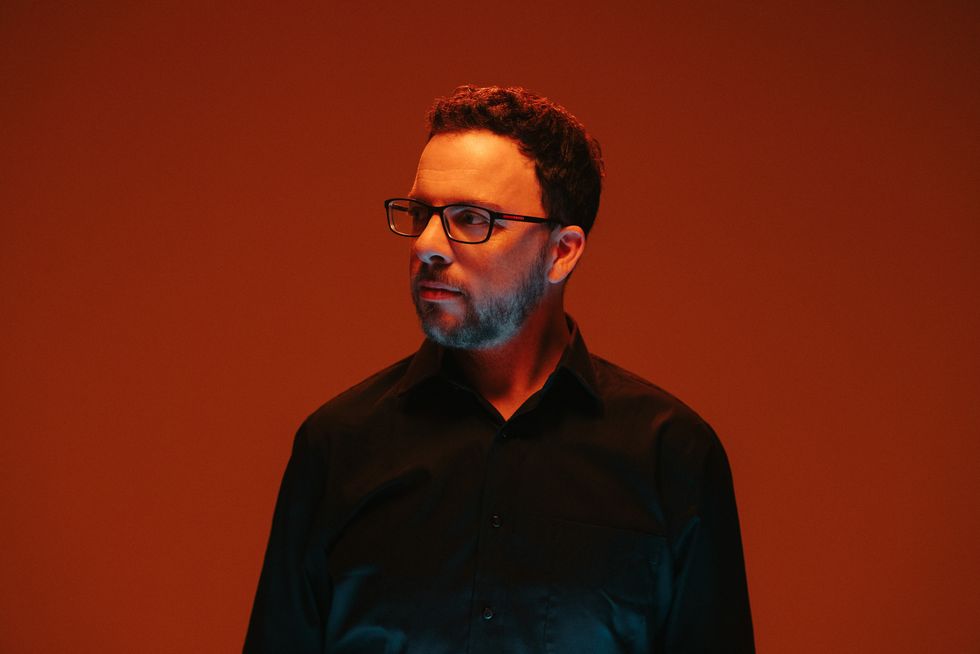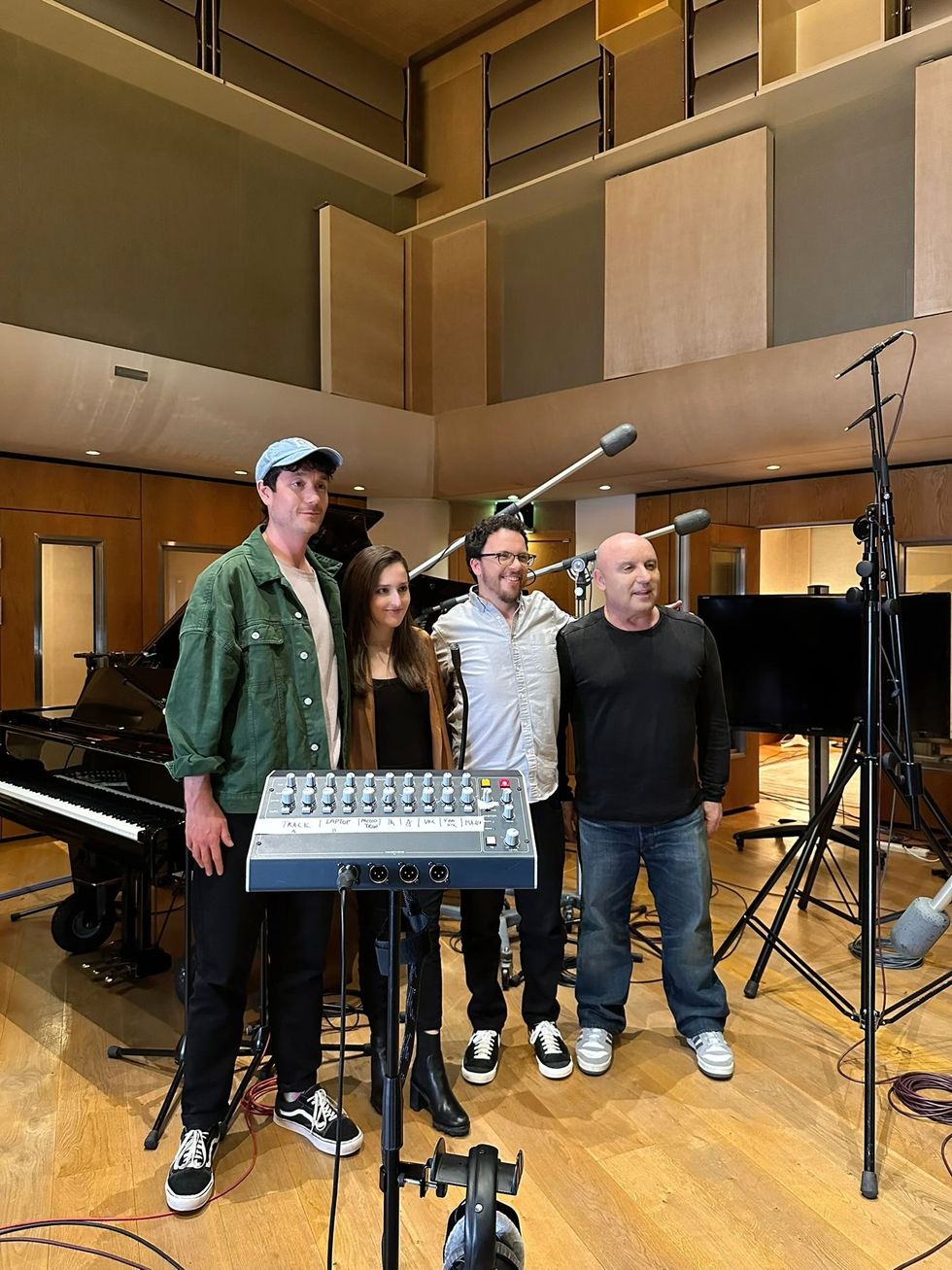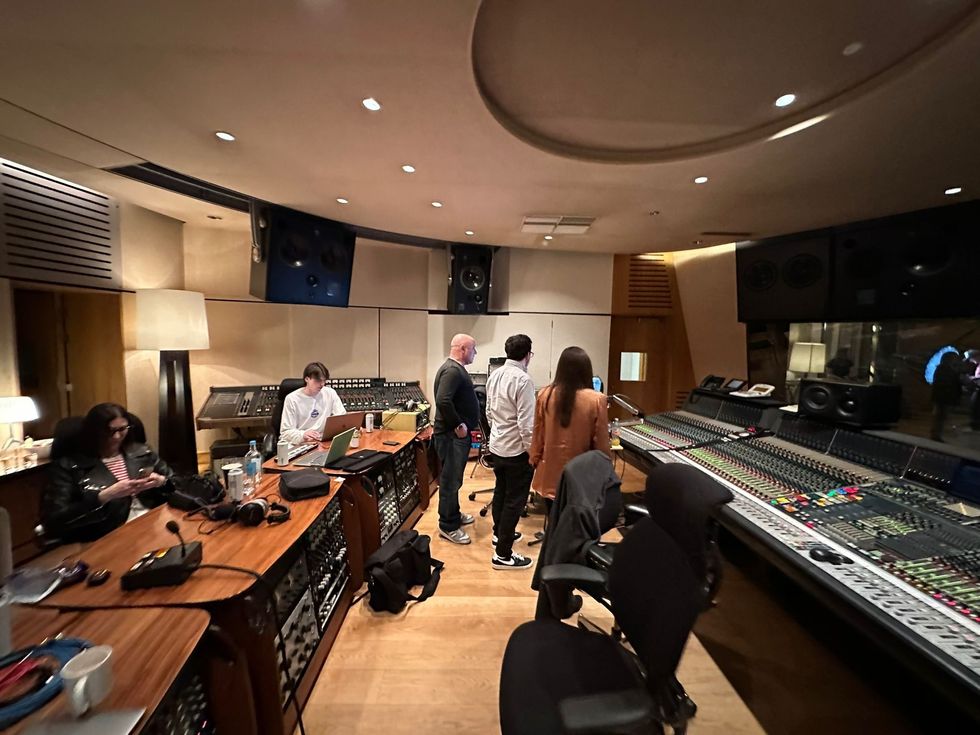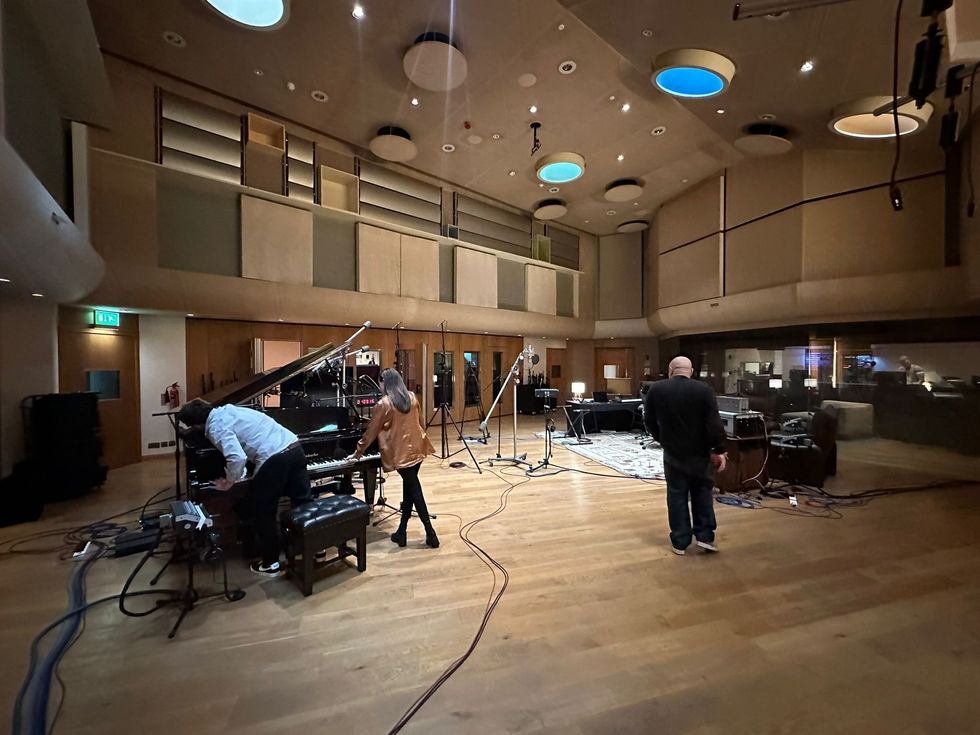
When Sara Barone and Jacob Shea of Bleeding Fingers Music teamed up to score Planet Earth III, they took on the colossal task of encapsulating some of our planet’s awe-inspiring narratives in music. Their collaboration has resulted in sounds that are as moving and multifaceted as the Earth itself. Together, they’ve crafted a score that not only complements the stunning visuals of the series but also highlights humanity’s intertwined existence with the natural world.
In this interview, we chat with them both about their approach to scoring one of the most visually stunning series on television.
From their initial excitement upon joining the project to their innovative use of unique sounds like Lea Bertucci’s woodwind performance in a cave, Sara and Jacob open up about the creative challenges and breakthroughs they experienced. Dive in below with us for an intimate look at the musical journey behind Planet Earth III.
Planet Earth III: Official Trailer | BBC Earth
www.youtube.com
No Film School: Can you share with us the early discussions that led to your participation in composing the score for Planet Earth III and describe your initial thoughts and feelings upon being approached for this project?
Jacob: We were invited to submit to be considered. The way that the BBC works is they don’t want to appear to have any sort of favoritism or impropriety. They have a list of people that they’re interested in working with but the process is by demo, and so they’ll send everyone a set of sequences and also ask for some theme ideas for the show.
Russell is the CEO of Bleeding Fingers—and Sara and I at the time were both really keen on the opportunity, amongst several other people in the larger company. So Sara and I pitched, and they responded to our material the strongest, and we got the gig by a kind of blind test. We were pretty thrilled to have the opportunity, and to run with it.
 Jacob Shea Bleeding Fingers Music
Jacob Shea Bleeding Fingers Music
Sara: I’ll just add that Jacob has already worked on Planet Earth II as well as many other BBC shows previously. This was my first time coming on as a composer for one of these shows and I had been such a fan of his work and just generally everything The BBC puts out, so I was very excited to have this opportunity.
 Sara Barone Bleeding Fingers Music
Sara Barone Bleeding Fingers Music
NFS: How did you approach blending the natural sounds of the world with musical instruments and modern technology to create a score that speaks to the intertwining of humanity and nature in the series?
Sara: In this season of Planet Earth III, each episode opens with a scene that begins with a really stunning natural spectacle and a conspicuous human presence, which is a very deliberate departure from the show’s previous seasons and reflects a new mindset. Through this lens of storytelling, humans are part of the picture, and this change in perspective was something that we really wanted the score to reflect. The result musically was that we anchored the score around soloists or solo players, so even in the most epic arrangements that we created, you can hear the unmistakable presence of a solo instrument or voice.
Jacob: As Sara was saying, these incredible musicians sort of did the heavy lifting for us by making this departure. There were moments, certainly with the “Coast” episode, with the crashing of the waves and how we underpinned the movement that was occurring on screen with our score. They needed to fit hand and glove, and we were really conscious about letting the natural elements in the sound design and the natural ambience of the space, letting those frequencies be at the center and our space carved out around it.
To Sara’s point, it was an injection of humanity into the series that usually only was reserved for behind the scenes footage. Now there are actually scenes in the proper episode that had humans involved. Sara and I took that as an opportunity to inject ourselves, and we both sang on it and we took it as an opportunity to try to not lose sight of the majesty of whatever we were watching, or the horror, or the kind of heartache, that there was this conspicuous human thing that you could pick out in in the score and go, this is a departure.
NFS: Can you talk about the creative process behind including unique sounds, like Lea Bertucci’s woodwind performance in a cave, and how you decided on such distinctive elements?
Both: So this was for the episode “Extremes”. The opening of the episode starts with this incredible imagery of the world’s largest cave, Hang Son Doong. It starts with this striking visual of a human repelling down the top of it, which looks like an ant in the backdrop of this enormous crevice. It’s unbelievable how large and otherworldly this cave actually is. You can imagine it in some sort of sci-fi film, or Jurassic Park. When you get into the sequence, you are introduced to many of the strange creatures that live there. We knew we had to do something really special for this musically.
We reached out to this experimental musician and woodwind player named Lea Bertucci, who sort of rejects the traditional approach to performance and does a lot of really interesting, extended techniques. We tasked her with a challenge to take this melody that we wrote and to go into a cave in upstate New York and basically go crazy with it. The natural sounds of the cave, combined with the incredible reverb that it created, along with Lea’s arsenal of instruments and experimental playing, resulted in some really otherworldly sounds that were beyond our wildest expectations.
 Bleeding Fingers Music
Bleeding Fingers Music
NFS: Could you share a particularly challenging moment or scene to score in Planet Earth III and how you overcame that challenge?
Jacob: We were both thinking of this one, and there were a myriad of moments. It’s harder as you get further away from it to remember them so clearly, so for me, I’ll say the last episode we worked on, which was “Humans”. This episode was the most vibrant and adventurous in a lot of ways, and challenging because every sequence had a human presence. I just remember doing the monocled cobra sequence and Freddie very much wanted the cobra to have a Killing Eve vibe, like this female assassin. We were working with Ari Mason to cultivate the persona of this cobra and I mocked it up with samples, so it kind of played the theme that I had in mind and Freddie heard that version was like, “I don’t know”. And then we sent it to Ari and she just brought a huge bag of character and heft to the piece.
You reach out to these musicians and it shouldn’t come as a surprise. It continually reminds me that hiring real people to do real things is a wonderful gift that keeps giving and so I sent it to Freddie and he went from being really lukewarm and me feeling a little nervous, to to him being completely sold.
Sara: I think that’s a really great example. Working on a series like this, where there’s so much music, you’re really stretched to create a very distinctive sound world for each of these animals and habitats featured in the sequences. You’re pushed to expand your palate in so many different directions. I think that’s generally a challenge with this type of work, which is also what’s so fun about scoring a show like this.
Jacob: You realize your job gets easier when you invite in people that have honed their craft. I’m thinking not only of soloists, but also The National Orchestra of Wales, who performed the orchestral material. You think about 40 people getting into a room and really emoting over a sequence. They see the picture. They have a discussion with us about what we’re aiming to achieve. The level of emotion and depth of feeling that comes from working with those musicians is continually unbelievable.
NFS: How did you balance the creative input from the production team, such as directors and producers, with your own artistic vision when composing for this series?
Sara: Even though each episode is distinctive, all of us involved in the project really are unified by the same overall purpose for the show and the message that the BBC is trying to convey. When we did our early work on the series, we co-wrote this main theme, which embodies the complex tone of the show. You’re balancing the idea that humans are pushing species and habitats to their limits of survival, but nature is resilient. The work we did on finding the tone for the main theme helped unify our story across the series. Even though each episode was different, we had that as a common thread throughout.
Jacob: Arriving at what that sound was going to be was like a North Star for the series. Even among the varied stuff that we did throughout the eight episodes, that was a mission driven anchor, where we definitely didn’t want to betray reality to such a degree that we were oblivious to what was going on. That was a top down creative direction that I think Sara and I really responded with and We were really excited about that. Because it was the third one- [Planet Earth] what is going to be the distinction here? We don’t want to repeat ourselves and we need something to carry us through all these minutes of music to write.
To have that direction from the showrunner, Matt Brandon was amazing. He was with us when we recorded with Bastille in London. He was there and even helped shape that vocal performance on the theme.
 Bleeding Fingers Music
Bleeding Fingers Music
NFS: Can you talk about a particular piece of music from the series that you are most proud of and the story behind its creation?
Sara: One of my favorite sequences was in the “Ocean” episode, the Deep Sea Octopus story, which was so fascinating and emotional. In the sequence, the female deep sea octopus will go down two miles into a thermal spring area of the ocean to lay eggs because they will hatch several times faster in this warmer environment. The scene shows this spectacle of female octopuses congregated together to lay their eggs in what they call an “octopus garden.”
Musically this sequence was quite special to score. I created a sound for the mother octopus with a lot of vocal layers, some of my own, and also featuring the incredible Ari Mason and Dan Smith of Bastille. We created some really warm, delicate, and other worldly textures to support these incredible images of the mother octopus working tirelessly to protect her eggs until they hatch and the babies swim away.
I built this orchestral piece around it, which has a feeling of rising and growing as you see the babies hatching and swimming up and away. The images are accompanied by bursts of string lines and synth arpeggios that match the movement of the hatchlings. The music evolves into a rather tragic moment because the mothers die as a result of this strenuous process. But it sort of ends with a sense of optimism as we cut back to the hatchlings beginning their lives. I think this emotional dichotomy is typical of Planet Earth and is one of the challenges of writing music for the series.
Jacob: For me, the seals versus sharks scene was a really surprising kind of behavior. I’d written the razor snake versus iguana chase sequence in Planet Earth II, and that scene was mostly harrowing. There was a brief moment of joy at the end…you were rooting for the little iguana. This seals vs. sharks sequence is a feel good story, a twist of fate. The chases are quite long but there’s a turning point where these seals realize that they’ve got strength in numbers.
You see this shark chasing these two seals and then all of a sudden they’re in this cove where there’s maybe 20 or 30 seals, and they’re like, we’re not having any of it. They get the shark to leave them alone by banding together in this swarm, this defensive mechanism of sorts. It was really fun to play off the high stakes of the chase, and then it’s pure celebration. It, in a moment, dawns on them that they actually have this in the bag.
The director was open to a more modern sound and I got to play guitar on it. It was a super fun experience. Like Sara said, there’s so much that is genuinely heartbreaking in the series. This was a “put your fist in the air” type of moment.
 Bleeding Fingers Music
Bleeding Fingers Music
NFS: Reflecting on your experience scoring for Planet Earth III, how has this project influenced your own personal connection to nature and your creative process as a composer moving forward?
Sara: In terms of my creative process, I felt like the experience of working on this show caused me to expand the scope of my palate beyond what I could have imagined. In this series, they do such a great job telling the stories of even the smallest and most overlooked species, like tiny bugs on a tree. Finding a voice for these diverse animals and habitats caused me to look to new places for inspiration and creativity.
Jacob: I alluded to this earlier, but I’m a big believer in just letting other people in. Sometimes you go off and work on some things that maybe don’t have the budget or resources or time for you. To have other people in the mix, there’s a huge boon in the ability to create something powerful, by teaming up and letting other voices in and leaning towards what people are naturally gifted at, like Sara who is a tremendous composer generally, but who also is incredibly lyrical in her writing.
So working on it influenced me to let people in the conversation as much as I can going forward.
NFS: Finally, what do you hope current and future viewers take away emotionally or philosophically from the music of Planet Earth III?
Sara: I hope that people feel that the score is aligned with the goals of the show and helps tell the stories that these incredible filmmakers have worked many years to tell.
Jacob: I kind of question whether or not that responsibility is there. Maybe people look at scores in that way. I certainly use music as a way of opening up my imagination and escaping and I would hope that the music provides some solace or escape. I don’t know that I aim to do anything more than to just do the imagery and the series justice. Maybe if the music was good enough, when they [people] listen to it, they are reminded of the sequence and it makes them think about nature a bit more, then all the better but if someone listens to it and likes it, then I’m happy.
Author: Jason Hellerman
This article comes from No Film School and can be read on the original site.
